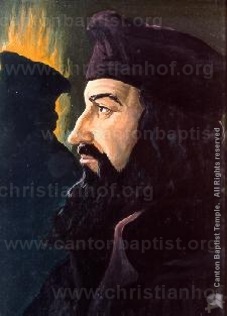John Huss
1369 – 1415
John Huss was ordained to the priesthood of the Roman Catholic Church in 1401 after receiving the Bachelor’s and Master’s degrees at the University of Prague. He preached against the evils of the Church and gained popular acceptance. He was the confessor for the Queen of Bohemia. He was a powerful preacher of Roman doctrine until he translated some of the sermons of John Wycliffe into the Bohemian language. These sermons moved him to cry out for reform in the Church and a return to the authority of the Scriptures as the sole source of faith and doctrine for the believer.
Huss maintained that Christ, not Peter, was the foundation of the Church and that some Popes had been heretics. At once Huss was branded a heretic, ex-communicated, and his writings were suppressed. He found refuge outside Prague, where he continued to preach, write and study. The chief product of Wycliffe’s pen, Concerning the Church, developed his teachings concerning the universal priesthood of all believers, emphasizing that Christ is the only Head of the Church. Because of this, some credit Huss with beginning the reformation that Martin Luther carried to full bloom one hundred years later.
In 1414, Huss was promised safe conduct by the Pope and Emperor Sigismund to the Council of Constance to present his views. Instead of hearing Huss, the Council had him arrested, gave him a mock trial without the benefit of an advocate, and condemned him to death as a heretic. He was kept in prison for seven months before he was burned. As Huss stood before the stake he said, “In the truth of the gospel which I have written, taught, and preached, I die willingly and joyfully today.” Then the fire was kindled, and as the red tongues of flame driven by the wind from Lake Boden rose high around the body of the martyr, Huss sang, “Jesus Christ, the Son of the Living God, have mercy on me.” The Pope dismissed his own broken promise of safe conduct to Huss with, “When dealing with heretics, one is not obligated to keep his word.”
The martyrdom of Huss kept the “religious pot” boiling for a hundred years so that a century later Martin Luther was warned against going to Leipzig even when promised a safe conduct by the Pope. The influence of Huss lived on through his preaching and the godly example of his death.

